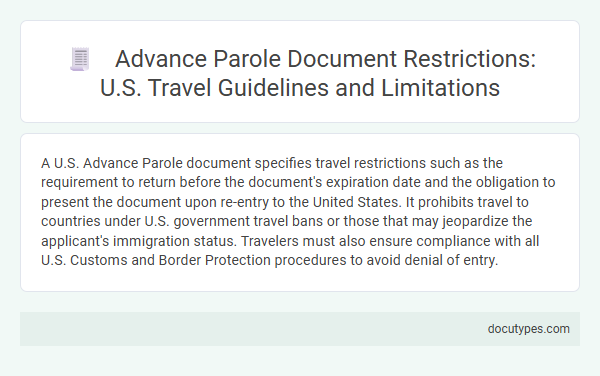A U.S. Advance Parole document specifies travel restrictions such as the requirement to return before the document's expiration date and the obligation to present the document upon re-entry to the United States. It prohibits travel to countries under U.S. government travel bans or those that may jeopardize the applicant's immigration status. Travelers must also ensure compliance with all U.S. Customs and Border Protection procedures to avoid denial of entry.
Understanding Advance Parole: Definition and Purpose
Advance Parole is a travel document issued by U.S. Citizenship and Immigration Services (USCIS) that allows certain non-citizens to re-enter the United States without a visa after traveling abroad. It serves as permission to temporarily leave and return to the U.S. while an immigration application is pending.
- Permission to Re-Enter - Advance Parole allows lawful re-entry to the U.S. for individuals who do not have a valid visa.
- Temporary Travel Authorization - It authorizes travel abroad for a limited period while an immigration benefit is pending.
- Non-Guarantee of Entry - Possession of Advance Parole does not guarantee admission, as final entry determination is made by Customs and Border Protection officers.
Who Qualifies for Advance Parole?
Advance Parole allows certain individuals to re-enter the U.S. without a visa after traveling abroad. This document is commonly issued to applicants with pending immigration status adjustments.
Eligibility for Advance Parole includes asylum seekers, DACA recipients, and individuals with pending adjustment of status applications. Your eligibility depends on specific immigration category requirements and USCIS approval.
Key Restrictions on Advance Parole Travel
Advance Parole documents grant permission for certain non-citizens to re-enter the United States after traveling abroad without a visa. These documents specify critical travel restrictions that must be followed to maintain valid entry rights.
- Validity Period - The document is only valid for the travel dates and expiration stated on the Advance Parole document.
- Purpose of Travel - Travel must align with the stated reason for Advance Parole, such as humanitarian, employment, or educational purposes.
- Risk of Entry Denial - Possession of Advance Parole does not guarantee re-entry; U.S. Customs and Border Protection retains discretion at the port of entry.
Travelers should carefully review all restrictions on their Advance Parole to avoid jeopardizing their U.S. immigration status.
Countries Prohibited for Advance Parole Holders
The U.S. Advance Parole document allows certain individuals to re-enter the United States after traveling abroad. However, holders of Advance Parole face restrictions on traveling to specific countries that are considered high-risk or have strained diplomatic relations with the U.S. Countries frequently prohibited for Advance Parole holders include Iran, North Korea, Syria, and Cuba, as travel to these nations may jeopardize re-entry permission or lead to legal complications.
Duration and Validity of Advance Parole Documents
U.S. Advance Parole documents specify the duration during which the holder is permitted to re-enter the United States without a visa. The validity period is clearly noted on the document, often ranging from six months to one year.
The duration of an Advance Parole document dictates the timeframe travelers must return to the U.S. before the document expires. Traveling beyond the validity period may lead to denial of re-entry. It is crucial for travelers to check the expiration date to ensure compliance with U.S. Customs and Border Protection regulations.
Risks of Leaving the U.S. with Advance Parole
What are the restrictions listed on a U.S. Advance Parole document? A U.S. Advance Parole document specifies that it does not guarantee re-entry into the United States. Travelers must ensure they do not have unresolved legal issues, such as deportation orders or pending removal proceedings, which could prevent their return.
What risks are associated with leaving the U.S. using Advance Parole? Leaving the U.S. with Advance Parole carries the risk of being denied entry upon return. Customs and Border Protection officers maintain discretion to refuse admission, and any changes in immigration policy or status can affect re-entry eligibility.
Re-entry Challenges and Denial Scenarios
A U.S. Advance Parole document allows certain immigrants to re-enter the United States without a visa but comes with specific restrictions. Re-entry challenges may include scrutiny by Customs and Border Protection officers, who can deny entry based on criminal records, immigration violations, or changes in eligibility status. Denial scenarios often occur if the traveler fails to maintain continuous eligibility, has outstanding removal orders, or provides false information during the application process.
Special Considerations for DACA and TPS Applicants
U.S. Advance Parole documents grant permission for certain non-citizens to re-enter the United States after temporary travel abroad. These documents include specific restrictions related to the duration and purpose of travel, which must be strictly followed to avoid jeopardizing immigration status.
Deferred Action for Childhood Arrivals (DACA) and Temporary Protected Status (TPS) applicants face unique considerations when using Advance Parole. Traveling without a valid Advance Parole or overstaying its limits can result in losing eligibility for DACA or TPS benefits.
Advance Parole and Pending Immigration Applications
Advance Parole allows you to re-enter the U.S. while a pending immigration application is being processed. Restrictions on the document ensure compliance with U.S. immigration laws and protect the integrity of your pending status.
- Travel Validity Period - The document specifies a limited time frame within which you must return to the U.S. to maintain your pending application status.
- Purpose of Travel - Advance Parole permits travel for specific reasons such as humanitarian, educational, or employment purposes but not for unauthorized immigration activities.
- Conditional Re-entry - Approval of Advance Parole does not guarantee admission; U.S. Customs and Border Protection may deny entry based on final eligibility determination at the port of entry.
What Are the Restrictions Listed on a U.S. Advance Parole Document? Infographic

